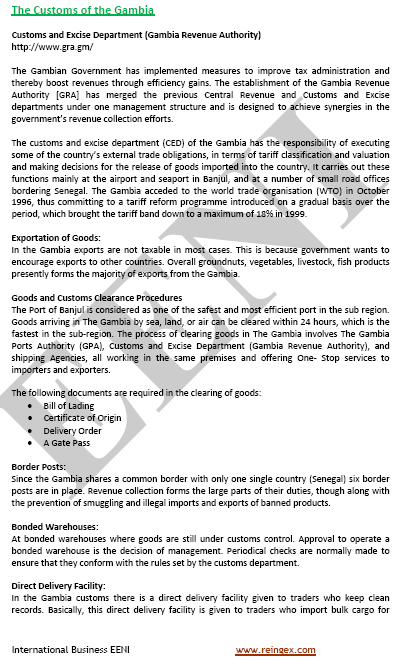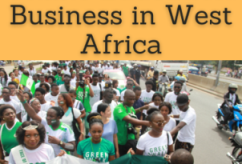Business in the Gambia, Gambian Economy
Gambia (Foreign Trade): agricultural export-oriented country, Banjul, Serrekunda
- Introduction to the Republic of the Gambia (West Africa)
- Doing Business in Banjul
- Gambian Economy
- International Trade of the Gambia
- Business and Investment Opportunities in the Gambia
- Air Transport Services
- Energy
- Agribusiness and fisheries
- Information and communications technology (ICT)
- Light Manufacturing
- River Transport
- Tourism
- Case Study: business opportunities in the Gambian agriculture sector
- Access to the Gambian Market
- Business Plan for the Gambia

The educational aims of the Subject “Foreign Trade, Logistics and Business in the Gambia” are:
- To analyze the Gambian Economy, Logistics and Global Trade
- To conduct research on business opportunities in the Gambia
- To explore the Gambian trade relations with the student's country
- To learn about Gambian Trade Agreements
- To develop a business plan for the Gambian Market

The Subject “Foreign Trade, Logistics and Business in the Gambia” is included within the curriculum of the following academic programs at EENI Global Business School:
Doctorate in African Business.

Master in Business in Africa, International Business, Foreign Trade.

Masters adapted to  Gambian Students.
Gambian Students.
Languages:  or
or  Gambie
Gambie  Gambia
Gambia  Gambia.
Gambia.
- Subject Credits “Doing Business in The Gambia”: 1


International Trade, Logistics and Business in the Gambia.
The Republic of the Gambia: an agricultural export-oriented country.

- Access to the Port of Dakar
- Dakar-Gambia-Lagos Logistics Corridor


Gambian Preferential Access and Trade Agreements:
- Gambia and the West African Economic Area
- West African Monetary Zone (WAMZ)
- African Continental Free Trade Area
- Economic Community of West African States (ECOWAS)
- Community of Sahel-Saharan States (CEN-SAD)
- European Union-Gambia:
- GSP
- Africa-EU Partnership
- AGOA
- Islamic Trade Preferential System

- World Trade Organization (WTO)
- Agreement on Trade in Services (GATS)
- Agreement on Sanitary Measures
- Agreement on Technical Barriers to Trade
- Agreement on Preshipment Inspection
- Agreement on Safeguards
- Trade Facilitation Agreement
- World Customs Organization (WCO)
- Kyoto Convention
- Hamburg Rules
- BIC (Containers)
- Chicago Convention (ICAO)
- International Maritime Organization
- Istanbul Convention
- ECOWAS Regional Road Transport and Transit Facilitation Programme
- Customs Convention on Containers - not a member

- Economic Commission for Africa
- African Union
- AUDA-NEPAD
- African Union Convention on Preventing and Combating Corruption
- Africa Agriculture Development Programme
- African Development Bank
- Africa-Asia Partnership
- Africa-Korea Partnership
- China-Africa Cooperation
- Africa-India Cooperation
- Africa-Japan Cooperation
- Africa-South America Summit
- Africa-BRICS
- Africa-Turkey Partnership

- Afro-Arab Cooperation
- Arab Bank for Africa (BADEA)
- Islamic Development Bank
- Organization of Islamic Cooperation (OIC)

- United Nations
- Conference on Trade and Development (UNCTAD)
- International Trade Centre
- World Intellectual Property Organization (WIPO)
- World Bank
- World Trade Organization (WTO)
- International Monetary Fund
- ...
- Area of The Gambia: 11,365 km²
- Gambian population: 1.75 million (40% of the population between 0-14, 40% of the Gambian population is literate)
- Borders of The Gambia: Senegal
- Capital of The Gambia: City of Banjul
- Largest Gambian city: Serrekunda
- Official language of The Gambia: English and different Gambian languages (Mandinka, Wollof, Fula, Jola)
- Currency of The Gambia: Dalasi
- Independence of The Gambia from the United Kingdom: 1965
More information: The Gambia (EENI African Business Portal).
Main Religions in The Gambia:
- Islam (90% of The Gambian Population)
- African Traditional Religions
- Christianity (8%)

Gambia belongs to the West African Economic Area.
The Gambian Economy:
- The Gambia is a Market-based Economy
- Gambian services sector: 58% of the Gambian GDP
- Fasting Gambian growing sector: tourism (16% of GDP)
- Gambian agricultural sector: 22% of GDP.
- 80% of the labour force
- Vision of the Government: “to become an export-oriented agricultural country”
- Top Gambian export markets: the EU, China, and India
- Top export products: peanuts, fish, cotton, and palm kernels
- Top exporter countries to the Gambia: China, Senegal, Brazil, the UK, India, and Indonesia
- Main Gambian port: Port of Banjul
- Export promotion and Zone Investor Incentives. Tax Holiday
- Mobile operators in the Gambia: Africell, Comium, Gamcel, and Qcel
Sample - Customs of the Gambia:

(c) EENI Global Business School (1995-2025)
Top of this page








 WhatsApp
WhatsApp